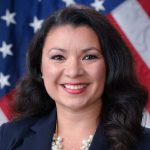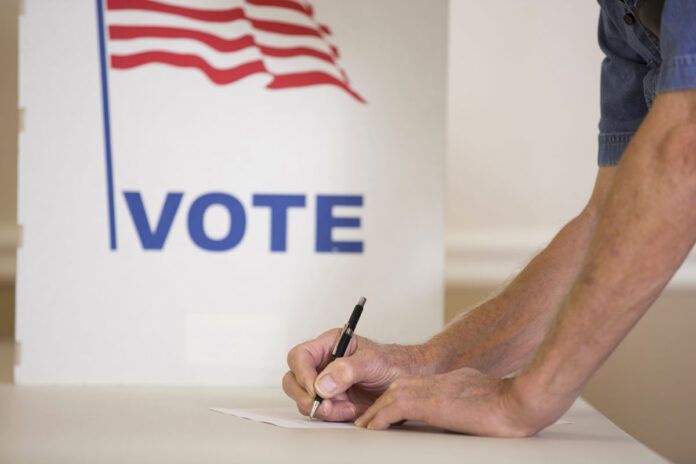Alejandra Sotelo-Solis, the 43-year old mayoral incumbent of National City and former city council member, is running for another term against former mayor Ron Morrison and current city council member Jose Rodriguez. If re-elected, she would like to take a closer look at homelessness in the community, how to leverage city assets for affordable housing and what can be done to promote business development.

To move the needle on homelessness, Sotelo-Solis said she wants to connect a plan that is already in place— hiring a city homeless coordinator— with a longterm goal of purposefully identifying who tends to be homeless in National City so they can be connected with agencies best suited to helping them.
“When we talk about ways to get folks off the streets it comes down to this: is there space to shelter them and is there a next step for wraparound services? We’re looking at creating a plan that is National City-centric that identifies what our homeless and unsheltered are dealing with. Is it the elder who just got evicted? Addiction? Mental health? Fill in the blank, we need to serve them,” Sotelo-Solis said.
The first step to doing that, she said, is currently taking shape as the city develops a point-in-time count independent of the one already federally mandated by the Department of Housing and Urban Development. The federal initiative seeks to count sheltered and unsheltered residents according to census blocks one night each year, usually held in late winter. Critics have noted that letting people know volunteers will be in the area with resources might inadvertently chase people out of their usual location and potentially skew results. Additionally, the 2021 in-person count was canceled entirely to protect against the spread of COVID-19.
However, Sotelo-Solis said her real concern with the homeless count is not its approach but the end goal of housing people, as housing is the bare minimum needed to get and keep people off the streets.
“The [point-in-time] is federally mandated but housing is the bare minimum. We’re going to go above that bare minimum, find out where they’re from, we’re going to find out what is ailing the unsheltered members of our community. We’ve heard statistics like ‘most don’t go outside a certain radius’ so maybe we can connect them with local LGBT resources, or a religious base, or whatever group provides them with connectedness.If we can get them local services, we can make our community stronger,” Sotelo-Solis said.
Gathering local data to connect local residents with local services will ultimately help the entire community, she said, as students and families won’t have to walk past a homeless encampment or engage with someone who might be under the influence of drugs.
Because National City is small, “our 8.5 square miles gives us the capacity to get in, gather data unique to the city and if we can help at that granular level, we can help as policy makers,” she said.
Recently, she said, a group of city staff members toured the Homeless Outreach Mobile Engagement program in La Mesa along with members of the police department. One thing she noted is that part of what makes the program successful is its connection with local agencies.
“As elected officials, we can put in new programs but they have to have roots we can place in the community,” Sotelo-Solis said.
Similarly, she would like to approach affordable housing development so it is age and community-friendly.
“People need to realize affordable housing is not free. It comes from a combination of loans, grants, people investing from their own pockets, monies from the city coffers. We need to leverage what we have but that takes time,” Sotelo-Solis said.
Even with funding in place, a large component of building what she calls ‘affordable housing that fits National City’ involves making sure there are components that fit the community.
“When we talk about affordable, subsidized housing, local partnerships have to go into it. Projects like Kimball Highlands— that’s everything. We have to have housing all ages can live in. Is there a senior center in the middle of it? Do they have a PACE adult health care center? Childcare? Affordable housing means including specific elements that make it a community asset,” Sotelo-Solis said.
She added she would like to address infrastructure, factor in how affordable housing development would fit in with Climate Action Plan goals, and “everything we need to connect with Vision Zero plans” for mass transit and public transportation options as well as create places for different generations to spend time together as a family.
“A younger generation is looking for a place to live in healthy rental units while they learn about saving and first time home ownership opportunities… We have to build up. In a built out community, you have to think creatively with a tower or another option, have to think outside the box. Many units are rentals but they can become home ownership properties,” Sotelo-Solis said, as those rental tenants mature into first-time homeowners.
Furthermore, she thinks the city can push stronger messaging on how to achieve home ownership, partner with financial institutions to help residents move their financial skills from making ends meet to making wiser choices to ultimately own a home.
In the meantime, the city needs to seek non-profit and developers as partners, figure out how to fund properties that can be built up instead of out, specifically in the downtown area.
“Downtown, that’s where it needs to be. When we talk about housing, you have to be paced. We have eight years to think about regional housing numbers. Now, we know school enrollment has gone down but we’re also expecting 10,000 new sailors at Naval Base San Diego so we need to have foresight. How are we creating infrastructure for people? Do we have enough fire stations? Enough police? Enough equipment to build a 22-story building? Where is the water going to come from? Whoever leads through that needs a longitudinal plan,” Sotelo-Solis said, although she did not specify how potential shortages would be addressed so as not to slow down affordable housing development.
If reelected, she would like to dedicate some time to building out a partnership with the Chamber of Commerce. The Chamber is “the city’s economic development partners” and needs to be welcoming with contact information available at all in-person and virtual introductions to strengthen business partnerships in the city.
“As we talk about major projects the city is working on- cannabis is up front,” she said and the city needs to focus on establishing internal processes and “get our departments ready for those doors to open” while the surrounding community creates a new business space.
National City, she said, as the only city in the county to allow cannabis lounges needs to lean in to developing a safe, creative and fun destination plan with community businesses that cross over with the cannabis market like food vendors.
“Hand in hand with public safety, we have to lean into it and recognize that in one year we’re going to have those financial resources. I’d love to see that invested in our youth and prevention but maybe we could consider some beautification efforts, an art district, small business investments or first-time business loans— there’s lots of opportunities there,” Sotelo-Solis said.
Additionally, she said, the waterfront balanced plan will likely pass while she finishes her current term, and it will allow for hotels, pop-up restaurants and other new business developments.
Finally, she would like the city to invest in its larger businesses like helping Mile of Cars strengthen business as new vehicle sales are restricted to electric cars by 2035, although she did not elaborate on that potential investment.












